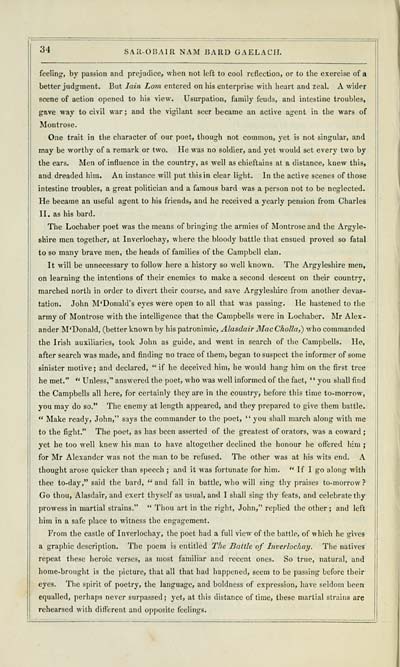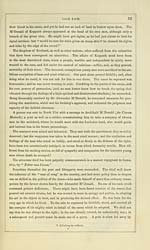Download files
Complete book:
Individual page:
Thumbnail gallery: Grid view | List view

'M SAR-0BA1R NAM J3ARD GAELACH.
feeling-, by passion and prejudice, when not left to cool reflection, or to the exercise of a
better judgment. But Jain Loin entered on his enterprise with heart and zeal. A wider
scene of action opened to his view. Usurpation, family feuds, and intestine troubles,
gave way to civil war ; and the vigilant seer became an active agent in the wars of
Montrose.
One trait in the character of our poet, though not common, yet is not singular, and
may be worthy of a remark or two. He was no soldier, and yet would set every two by
the ears. Men of influence in the country, as well as chieftains at a distance, knew this,
and dreaded him. An instance will put this in clear light. In the active scenes of those
intestine troubles, a great politician and a famous bard was a person not to be neglected.
He became an useful agent to his friends, and he received a yearly pension from Charles
II. as his bard.
The Lochaber poet was the means of bringing the armies of Montrose and the Argyle-
shire men together, at Inverlochay, where the bloody battle that ensued proved so fatal
to so many brave men, the heads of families of the Campbell clan.
It will be unnecessary to follow here a history so well known. The Argyleshire men,
on learning the intentions of their enemies to make a second descent on their country,
marched north in order to divert their course, and save Argyleshire from another devas-
tation. John M'Donald's eyes were open to all that was passing. He hastened to the
army of Montrose with the intelligence that the Campbells were in Lochaber. Mr Alex-
ander M'Donald, (better known by his patronimic, Alasdair Mac Cholla ,) who commanded
the Irish auxiliaries, took John as guide, and went in search of the Campbells. He,
after search was made, and finding no trace of them, began to suspect the informer of some
sinister motive; and declared, " if he deceived him, he would hang him on the first tree
he met." " Unless," answered the poet, who was well informed of the fact, " you shall find
the Campbells all here, for certainly they are in the country, before this time to-morrow,
you may do so." The enemy at length appeared, and they prepared to give them battle.
" Make ready, John," says the commander to the poet, " you shall march along with me
to the fight." The poet, as has been asserted of the greatest of orators, was a coward ;
yet he too well knew his man to have altogether declined the honour he offered him ;
for Mr Alexander was not the man to be refused. The other was at his wits end. A
thought arose quicker than speech ; and it was fortunate for him. •' If I go along with
thee to-day," said the bard, "and fall in battle, who will sing thy praises to-morrow?
Go thou, Alasdair, and exert thyself as usual, and I shall sing thy feats, and celebrate thy
prowess in martial strains." " Thou art in the right, John," replied the other ; and left
him in a safe place to witness the engagement.
From the castle of Inverlochay, the poet had a full view of the battle, of which he gives
a graphic description. The poem is entitled The Battle of Inverlochay. The natives
repeat these heroic verses, as most familiar and recent ones. So true, natural, and
home-brought is the picture, that all that had happened, seem to be passing before their
eyes. The spirit of poetry, the language, and boldness of expression, have seldom been
equalled, perhaps never surpassed; yet, at this distance of time, these martial strains are
rehearsed with different and opposite feelings.
feeling-, by passion and prejudice, when not left to cool reflection, or to the exercise of a
better judgment. But Jain Loin entered on his enterprise with heart and zeal. A wider
scene of action opened to his view. Usurpation, family feuds, and intestine troubles,
gave way to civil war ; and the vigilant seer became an active agent in the wars of
Montrose.
One trait in the character of our poet, though not common, yet is not singular, and
may be worthy of a remark or two. He was no soldier, and yet would set every two by
the ears. Men of influence in the country, as well as chieftains at a distance, knew this,
and dreaded him. An instance will put this in clear light. In the active scenes of those
intestine troubles, a great politician and a famous bard was a person not to be neglected.
He became an useful agent to his friends, and he received a yearly pension from Charles
II. as his bard.
The Lochaber poet was the means of bringing the armies of Montrose and the Argyle-
shire men together, at Inverlochay, where the bloody battle that ensued proved so fatal
to so many brave men, the heads of families of the Campbell clan.
It will be unnecessary to follow here a history so well known. The Argyleshire men,
on learning the intentions of their enemies to make a second descent on their country,
marched north in order to divert their course, and save Argyleshire from another devas-
tation. John M'Donald's eyes were open to all that was passing. He hastened to the
army of Montrose with the intelligence that the Campbells were in Lochaber. Mr Alex-
ander M'Donald, (better known by his patronimic, Alasdair Mac Cholla ,) who commanded
the Irish auxiliaries, took John as guide, and went in search of the Campbells. He,
after search was made, and finding no trace of them, began to suspect the informer of some
sinister motive; and declared, " if he deceived him, he would hang him on the first tree
he met." " Unless," answered the poet, who was well informed of the fact, " you shall find
the Campbells all here, for certainly they are in the country, before this time to-morrow,
you may do so." The enemy at length appeared, and they prepared to give them battle.
" Make ready, John," says the commander to the poet, " you shall march along with me
to the fight." The poet, as has been asserted of the greatest of orators, was a coward ;
yet he too well knew his man to have altogether declined the honour he offered him ;
for Mr Alexander was not the man to be refused. The other was at his wits end. A
thought arose quicker than speech ; and it was fortunate for him. •' If I go along with
thee to-day," said the bard, "and fall in battle, who will sing thy praises to-morrow?
Go thou, Alasdair, and exert thyself as usual, and I shall sing thy feats, and celebrate thy
prowess in martial strains." " Thou art in the right, John," replied the other ; and left
him in a safe place to witness the engagement.
From the castle of Inverlochay, the poet had a full view of the battle, of which he gives
a graphic description. The poem is entitled The Battle of Inverlochay. The natives
repeat these heroic verses, as most familiar and recent ones. So true, natural, and
home-brought is the picture, that all that had happened, seem to be passing before their
eyes. The spirit of poetry, the language, and boldness of expression, have seldom been
equalled, perhaps never surpassed; yet, at this distance of time, these martial strains are
rehearsed with different and opposite feelings.
Set display mode to: Large image | Transcription
Images and transcriptions on this page, including medium image downloads, may be used under the Creative Commons Attribution 4.0 International Licence unless otherwise stated. ![]()
| Early Gaelic Book Collections > J. F. Campbell Collection > Sar-obair nam bard gaelach, or, The beauties of Gaelic poetry > (124) |
|---|
| Permanent URL | https://digital.nls.uk/81881582 |
|---|
| Description | Volumes from a collection of 610 books rich in Highland folklore, Ossianic literature and other Celtic subjects. Many of the books annotated by John Francis Campbell of Islay, who assembled the collection. |
|---|
| Description | Selected items from five 'Special and Named Printed Collections'. Includes books in Gaelic and other Celtic languages, works about the Gaels, their languages, literature, culture and history. |
|---|

